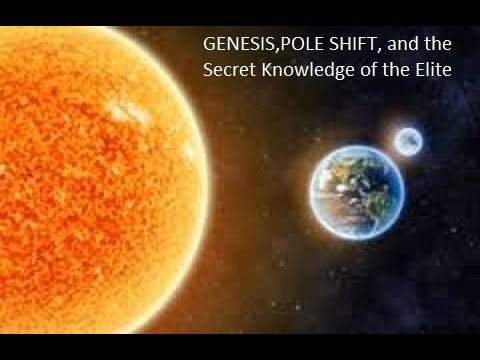Arthur Custance, top scholar on Book of Genesis, suggests POLE SHIFTS in Bible

Genesis 1:1 traditionally begins in English: "In the beginning God created the heavens and the earth. The earth was formless and void..."
But renowned linguist and expert on Genesis Arthur Custance said we should not read it this way; that the grammar is wrong if we assume this interpretation. So who is Arthur Custance, and why should we care what he thinks?
Custance was a British-born Canadian scientist who converted to Christianity and tried to bridge the gap between science and religion. He completed his PhD at the University of Ottawa in 1959 and served as head of the Human Engineering Laboratories of the Defense Research Board in Ottawa. Wikipedia says he is: "An expert on the most ancient Aramaic, Hebrew, and Greek versions of the bible."
And in his elaboration on the incorrect common translation of the opening word of the Hebrew Bible he notes the same problem exists in the nearly identical opening line of the Babylonian Enuma Elish - which in connection with this same opening word (In Hebrew, the word bereshith) one or two interesting points are raised by a study of Schrader's Cuneiform Inscriptions and the Old Testament, as translated by Owen C. Whitehouse.
"There is the same controversy over the exact meaning of the cuneiform word which opens the Babylonian account of Creation and which therefore stands in the same relation to the rest of the cuneiform text as this Hebrew word does to the Hebrew text."
Schrader concluded that the opening line of the Enuma Elish should be understood to describe: "The re-creation of Chaos into an ordered universe." That means the Babylonian "beginning" is a "re-creation" from chaos into order.
Custance's conclusion on Genesis 1:1 is that it should be translated: "IN A FORMER STATE GOD PERFECTED THE HEAVENS AND THE EARTH." and that before the next verse (Genesis 1:2) there was a gap in time is which this previously perfected creation suffered God's judgment and was reduced to chaos and needed to be RESTORED to order over the six days of (RE)creation described afterwards.
Custance says the earliest Aramaic version of the Bible's Book of Genesis says “the earth was laid waste.” He wrote: “After studying the problem for some thirty years and after reading everything I could lay my hands on pro and con and after accumulating in my own library some 300 commentaries on Genesis, the earliest being dated 1670, I am persuaded that there is, on the basis of the evidence, far more reason to translate Genesis 1:2 as “IN A FORMER STATE GOD PERFECTED THE HEAVENS AND EARTH; BUT THE EARTH HAD BECOME A DEVASTATED RUIN… than there is for any of the conventional translations.”
Of course I feel this supports the idea that both Genesis and Revelation are talking about a POLE SHIFT.
Another web site, which doesn't mention Custance at all, is also supportive of these ideas, suggesting that Genesis 1:2 is "not a description of the original creation of all things (like Genesis 1:1 is). Rather, they are a Divine special regeneration of the cosmos made from what already was here before the present world of Man. In other words, there are two (2) creation events in Genesis. The first is described in a one-sentence statement at Genesis 1:1 and occurred billions of years ago. The second occurred relatively recently and was accomplished in 7 days, and very detailed, beginning at Genesis 1:3. This is why the Bible at Genesis 2:4 says: "These are the generations [plural] of the heavens and of the earth when they were created, in the day that the LORD God made the earth and the heavens."
Let's look at 2 Peter 3:5-7: "...it escapes their notice that by the word of God the heavens existed long ago and the earth was formed out of water and by water, through which the world at that time was destroyed, being flooded with water. But by His word the present heavens and earth are being reserved for fire, kept for the day of judgment and destruction..."
Because the same site also explains:
"2 Peter 3:5-7 is NOT a reference to Noah's flood. There are only two (2) places in the entire Bible where the Earth is flooded by water. One is at the time of Noah's flood (Genesis 7). The other is at Genesis 1:2 where it speaks about the condition of the Earth at the time just before God said, "Let there be light." Now, if 2 Peter 3:5-7 is not a cross-reference to Noah's flood, then it MUST be a cross-reference to Genesis 1:2 (there is no other alternative - simple logic). And if 2 Peter 3:5-7 is a cross-reference to Genesis 1:2, then the Holy Spirit is calling your attention to something very significant that millions of Neo-Creationists are blindly overlooking. Specifically, that a glorious ancient world that God created in the distant past (Genesis 1:1), had long since been utterly destroyed; plunged into deep darkness and overflowed by a raging flood of great waters on a universal scale at the time of Genesis 1:2."
"...It is very important that we show you the Biblical clues that tell us why 2 Peter 3:5-7 is not a reference to Noah's flood. Clue #1 - Compare the phrase: "the heavens and earth, which are now" to the phrase the "heavens were of old": What does this mean? Ask yourself this question: When Noah's flood happened did it change anything in the upper heavens? Would a flood on the Earth's surface have any effect on the sun, moon, or stars high above? The obvious answer is NO...."
(A pole shift, in which the surface of the entire planet moves as one solid piece over the core, would drastically change our view of the heavens.)
At this point you might be thinking: "All this is great - but you said in your blog post title that Arthur Custance suggested a pole shift. His translation of the start of the Book of Genesis may be supportive, but... where does he suggest a pole shift?"
Well, Custance was a scientist and wrote many other books and articles. In one he noted:
"There is plenty of proof that the early home of the human race, Northern Persia, Armenia and the neighbouring countries, has been under water at a comparatively recent date geologically speaking -- certainly since the Ice Age. At Trebizond, on the Black Sea, there is a raised beach of 750 feet up the mountain. The Caspian, the Sea of Aral and Lake Balkash have no outlet, but their waters are still comparatively fresh. Therefore, they must be of recent origin" because the concentration of evaporated salts has not risen significantly (as it has for most other inland lakes with no outlet to the sea, such as Great Salt Lake or the Dead Sea.)
He has also noted: "If for some reason the land masses were submerged, the oceans could easily pour over them, and in fact have done so in different places and at different times." No, he never uses the phrase "pole shift" but...
Yes, I think Custance was aware of the periodic cycle of POLE SHIFTS


